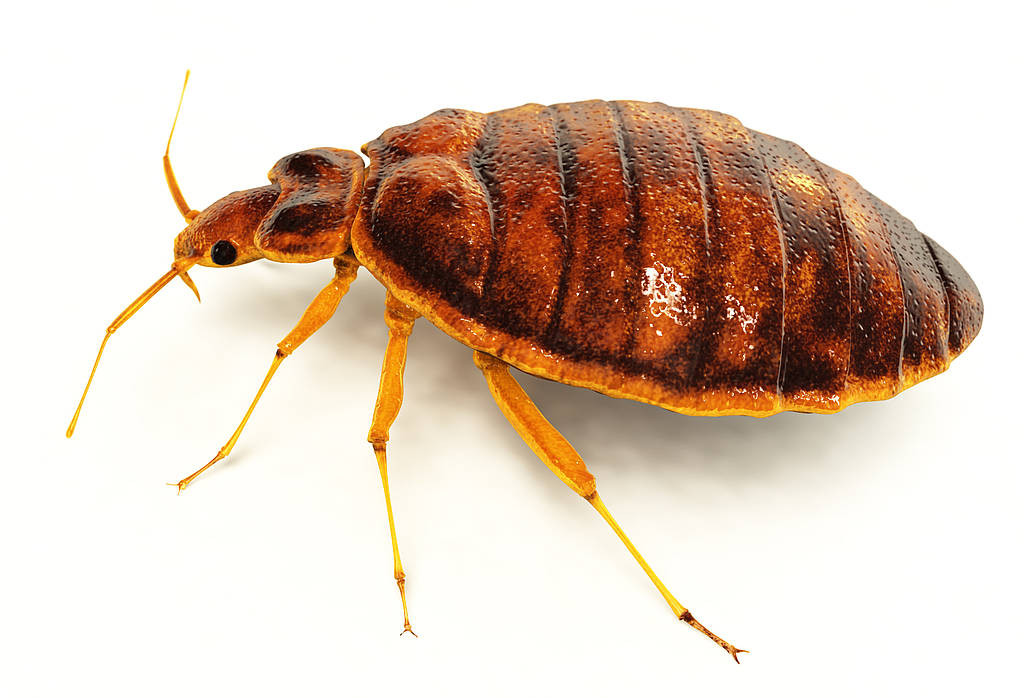Bed bugs

Bed bugs are small insects that feed on human blood, usually at night. Although they feed on humans and animals, they don’t live on us, or pierce our skin. They prefer to move short distances and get around through getting into luggage and personal belongings.
Bed bugs are skilled at hiding in tight spaces. They can do this easily as they range from 1mm – 7mm in size. They are commonly found:
- On mattresses
- In picture frames
- Behind wall paper
- On bed frames
- In cracks such as behind skirting boards, clothes, between floor boards, and carpet edges.
They are a cream colour, then change to red or black after feeding on blood. They return to their hiding places to lay eggs and multiply.
Pest fact: If a bed bug problem is not properly treated, it can get so serious that you may need to destroy your bed, bedding, and other furniture.
What harm can be caused by bed bugs?
Bed bugs are more of a nuisance than a dangerous health threat – they haven’t been found to transmit disease. But getting bitten can be painful, itchy and uncomfortable for some people. It may cause allergic reactions in the area bitten.
Once they call a place home, these tiny squatters become really hard to get rid of. Beds and mattresses may need to be destroyed, and a program of insecticide treatment may need to be set up.
What should I watch out for?
- Eggs: 1mm, cream coloured, and well hidden
- Dark spots of bed bug droppings or blood
- Live bed bugs or their old skins
- Marks on skin:
- Blisters or hives
- Bites in a line or grouped in a small area
- Bite with a red, swollen area, and dark red centre
Note
1 in 5 people are not affected by bites, and when it happens, there’s a burning sensation which may not be noticed for up to 9 days.
How can I avoid bed bugs?
Travelling : Bed bugs can be found anywhere people sleep, although its most common in low cost accommodation (bed bugs kept Rusty very busy in Queensland backpacking hostels during his work and travel stint in Australia all those years ago. (More about Rusty...)
What you can do while traveling:
- Spray the outside of luggage with aerosol insecticide
- Check luggage before and after leaving accommodation
- Look out for bed bugs everywhere you stay.
Warning: Even modern homes have reported bed bugs due to central heating – and not being aware of how they infest and how to avoid them.
At home :
- Check guest bags and ask if they’ve had any insect bites
- Inspect second hand furniture carefully
- Vacuum regularly.
What should I do if I get bitten?
Better Health Channel’s suggestions to treat bedbugs:
- Try not to scratch (could cause infection with swelling, bleeding)
- Use an icepack to help with the swelling
- Treat the itching with calamine lotion or anaesthetic creams
- Take pain relief if symptoms are severe
- Visit a doctor if you get an infection.
Find out more
- Bed bugs (WA Department of Health)
- When Bed Bugs Bite (Healthline)
- Don’t let the bedbugs bit, ever again: new treatments could help win war on pests (Sydney Morning Herald)
Want to prevent or get rid of bed bugs?
Do you think you may have bed bugs at your place? Would you like to prevent bed bugs from becoming a problem?
Call Rusty on 1800 787 897 for advice and inspection.

 © 2016 Rusty's Pest Management Solutions
© 2016 Rusty's Pest Management Solutions